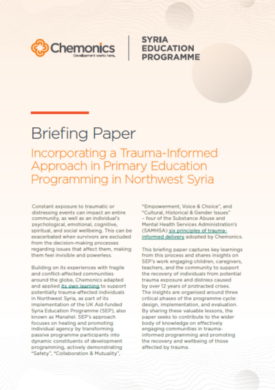Providing children living in Syria with a safe, inclusive, and high-quality education that meets their specialized learning, psychological, and protection needs.

Incorporating a Trauma-Informed Approach in Primary Education Programming in Northwest Syria .
Paper | August 22, 2023

Constant exposure to traumatic or distressing events can impact an entire community, as well as an individual’s psychological, emotional, cognitive, spiritual, and social wellbeing. This can be exacerbated when survivors are excluded from the decision-making processes regarding issues that affect them, making them feel invisible and powerless.
Building on its experiences with fragile and conflict-affected communities around the globe, Chemonics adapted and applied its own learning to support potentially trauma-affected individuals in Northwest Syria, as part of its implementation of the UK Aid-funded Syria Education Programme (SEP), also known as Manahel. SEP’s approach focuses on healing and promoting individual agency by transforming passive programme participants into dynamic constituents of development programming, actively demonstrating “Safety”, “Collaboration & Mutuality”, “Empowerment, Voice & Choice”, and “Cultural, Historical & Gender Issues” – four of the Substance Abuse and Mental Health Services Administration’s (SAMHSA) six principles of trauma-informed delivery adopted by Chemonics.
This briefing paper captures key learnings from this process and shares insights on SEP’s work engaging children, caregivers, teachers, and the community to support the recovery of individuals from potential trauma exposure and distress caused by over 12 years of protracted crises. The insights are organised around three critical phases of the programme cycle: design, implementation, and evaluation. By sharing these valuable lessons, the paper seeks to contribute to the wider body of knowledge on effectively engaging communities in trauma-informed programming and promoting the recovery and wellbeing of those affected by trauma.
This briefing paper was authored by Reham Jabbar, Syria Education Programme.
